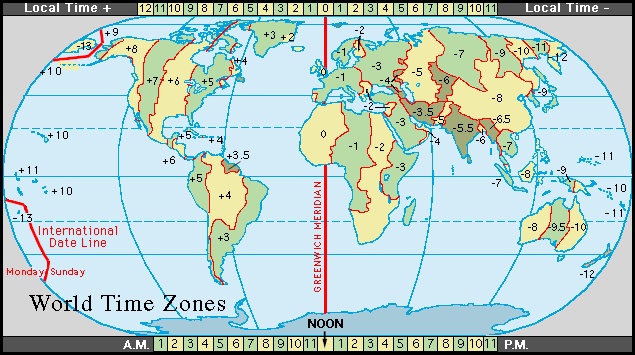standard time
the time of a region or country that is established by law or general usage as civil time.
The concept of standard time was adopted in the late 19th century in an attempt to end the confusion that was caused by each community's use of its own solar time. Some such standard became increasingly necessary with the development of rapid railway (railroad) transportation and the consequent confusion of schedules that used scores of different local times kept in separate communities. (Local time varies continuously with change in longitude.) The need for a standard time was felt most particularly in the United States and Canada, where long-distance railway routes passed through places that differed by several hours in local time. Sir Sandford Fleming (Fleming, Sir Sandford), a Canadian railway planner and engineer, outlined a plan for worldwide standard time in the late 1870s. Following this initiative, in 1884 delegates from 27 countries met in Washington, D.C., and agreed on a system basically the same as that now in use.
 The present system employs 24 standard meridians of longitude (lines running from North Pole to South Pole, at right angles to the Equator) 15° apart, starting with the prime meridian (Greenwich meridian) through Greenwich, England. These meridians are theoretically the centres of 24 standard time zones (time zone) (as illustrated in the Figure-->
The present system employs 24 standard meridians of longitude (lines running from North Pole to South Pole, at right angles to the Equator) 15° apart, starting with the prime meridian (Greenwich meridian) through Greenwich, England. These meridians are theoretically the centres of 24 standard time zones (time zone) (as illustrated in the Figure--> ), although in practice the zones often are subdivided or altered in shape for the convenience of inhabitants; a notable example of such alteration is the eastward extension of the International Date Line around the Pacific island country of Kiribati. Time is the same throughout each zone and differs from the international basis of legal and scientific time, Coordinated Universal Time, by an integral number of hours; minutes and seconds are the same. In a few regions, however, the legal time kept is not that of one of the 24 standard time zones because half-hour or quarter-hour differences are in effect there. In addition, Daylight Saving Time is a common system by which time is advanced one hour from standard, typically to extend daylight hours during conventional waking time and in most cases for part of the year (usually in summer).
), although in practice the zones often are subdivided or altered in shape for the convenience of inhabitants; a notable example of such alteration is the eastward extension of the International Date Line around the Pacific island country of Kiribati. Time is the same throughout each zone and differs from the international basis of legal and scientific time, Coordinated Universal Time, by an integral number of hours; minutes and seconds are the same. In a few regions, however, the legal time kept is not that of one of the 24 standard time zones because half-hour or quarter-hour differences are in effect there. In addition, Daylight Saving Time is a common system by which time is advanced one hour from standard, typically to extend daylight hours during conventional waking time and in most cases for part of the year (usually in summer).- Mount Tahan
- Mount Tai
- Mount Tambora
- Mount Taranaki
- Mount Toubkal
- Mount Unzen
- Mount Vernon
- Mount Waialeale
- Mount Washington
- Mount Whitney
- Mount, William Sidney
- Mount Wilson
- Mount Wilson Observatory
- Mount Wutai
- Moura
- Mourad Bourboune
- Mourne Mountains
- mourning
- Mourning, Alonzo
- mourning dove
- mouse
- mousetail
- moussaka
- mousse
- Mousterian industry